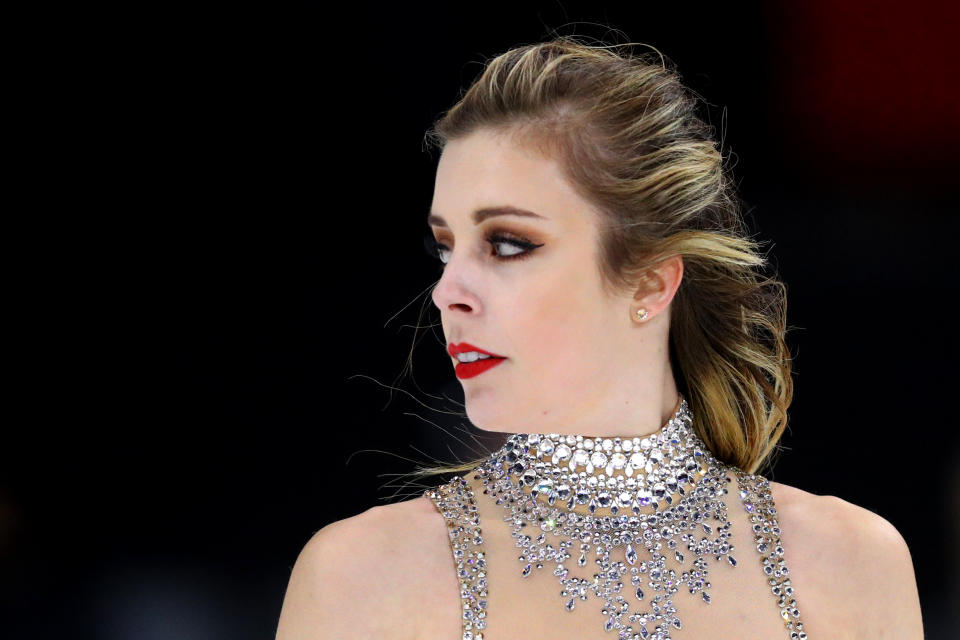Figure skater Ashley Wagner: 'I was sexually assaulted by John Coughlin' at 17
- Oops!Something went wrong.Please try again later.
- Oops!Something went wrong.Please try again later.
Figure skater Ashley Wagner wrote a powerful first-person essay that appeared on USA Today on Thursday, bravely recounting her sexual assault. In the essay, she says that the man who assaulted her was now-deceased figure skater John Coughlin.
Wagner says that the assault happened in June 2008, when she had just turned 17. She went to her first party while she was at a figure skating camp in Colorado Springs, a house party thrown by several local athletes. She and her friends were offered beds in the house when they couldn’t find rides back to their hotel at the end of the night, and Wagner said that she felt “safe” because she was with her friends.
In the middle of the night, Wagner wrote that she woke up when Coughlin, who was 22 at the time, came into the room and got into bed with her. She said that he started kissing her neck and touching her, and pretending to be asleep didn’t make him stop.
When he continued to wander further over my body, I started to get scared because he was so much bigger than I was, and I didn’t know if I could push him off. I just continued to lie there pretending to be asleep, hoping that he would get bored and go somewhere else. He didn’t.
I then felt myself starting to cry, and I knew I had to make a choice. I opened my eyes and pulled away from him as he kissed my neck. I grabbed his invading hand, and I told him to stop. And he did. He looked at me for a few seconds, quietly got up and left the room. All of this happened over the period of about five minutes. That is such a small amount of time, but it's haunted me ever since.
The next morning, Wagner says that Coughlin acted like nothing happened, so she did too. No one had explained consent to her, so while she didn’t feel right about what happened, she wasn’t sure how to define it. She told two people about the incident, but never mentioned it to her parents — she was afraid they would be angry at her for being at a party. Eventually, she realized she’d been sexually assaulted.
I now know that regardless of the events of that night, I got into that bed thinking I was safe to just fall asleep. He was the one who took away that safety. I went into that house just wanting to have fun with my friends. He was the one who shattered all of that. Going to the party in no way, shape or form gave that man permission to touch me. I never once said anything that made him think that it was okay to take control of my body away from me. My presence at a party did not imply my consent. I wish I could have learned that sooner. The years of guilt I have felt should not have rested on me, but on him.
I was sexually assaulted by John Coughlin.

Wagner wrote that she chose to come forward with her story because the person who assaulted her was a fellow figure skater — not because it was John Coughlin, who committed suicide in January after SafeSport suspended him for an unspecified infraction, which led his former figure skating partner to accuse him of sexually assaulting her.
When Wagner recently watched 13-year-old Alysa Liu become the U.S. figure skating champion, she knew she had to speak up about the deep power imbalances in the sport. A talented 13-year-old could compete at the same level as older teenagers and people in their 20s, which means they’re together all the time — something that Wagner says is not normal.
The bottom line is, people need to talk more about this. As a 17-year-old in skating, my social world was so small. As a man in his 20s in skating, his social scene was also minuscule, mostly teenagers competing in the sport. This is a pressure-cooker environment that will continue to create uncomfortable, inappropriate and unsafe work places unless something is done about it.
I want kids to be able to stay kids in this sport. People need to start talking about how to create boundaries. My talent and ability should not have been what defined the people who were around me.
Wagner knows that she will probably be criticized for sharing her story, but she felt that she had no other choice but to fight for the sport she loves, and for other young girls who love it as much as she does.
Coming forward now was a difficult choice to make. I know that there will be people who pick this apart, who criticize me and question me. At the end of the day, however, I had to make a choice: to stay quiet or to push forward and demand change in a sport that I love. When I looked at it that way, the decision became crystal clear.
I chose to speak up.
More from Yahoo Sports:

